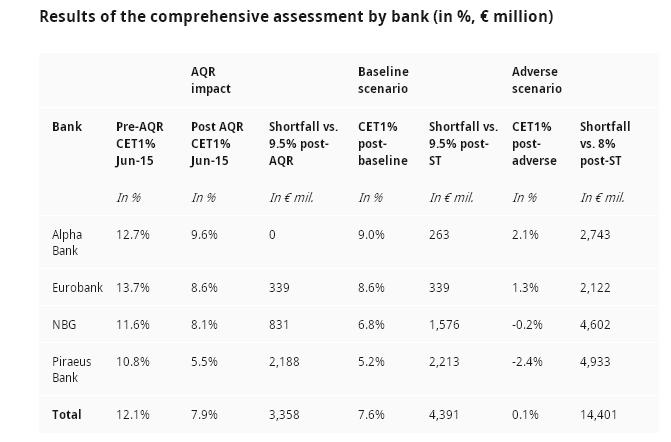IMF, (2016), “Staff Concluding Statement of the 2016 Article IV Mission”, International Monetary Fund, 23 September A Concluding Statement describes the preliminary findings of IMF staff at the end of an official staff visit (or ‘mission’), in most cases to a member country. Missions are undertaken as part of regular (usually annual) consultations under Article IV of the IMF’s Articles of Agreement, in the context of a request to use …Read More
Structural and Cyclical Factors of Greece’s Current Account Balances: A Note
Bardakas, Ioanna C., (2016), “Structural and Cyclical Factors of Greece’s Current Account Balances: A Note”, Bank of Greece, Αpril This note examines the relative importance of cyclical and structural factors in determining Greece’s current account performance. I use a number of filters to remove the long-term component and isolate the cyclical factors. It is shown that for the last 15- years the structural component explains most of the variation in the …Read More
Greece : Preliminary Debt Sustainability Analysis-Updated Estimates and Further Considerations
IMF, “Greece : Preliminary Debt Sustainability Analysis-Updated Estimates and Further Considerations”, Country Report No. 16/130, 23 May Greece continues to face a daunting fiscal consolidation challenge. After seven years of recession and a structural adjustment of 16 percent of GDP, Greece has only managed to achieve a small primary surplus in 2015, and this due to sizeable one-off factors. This is still far away from its ambitious medium-term primary surplus target of …Read More
Where did the Greek bailout money go?
Rocholl, J., and A. Stahmer (2016), “Where did the Greek bailout money go?”, ESMT White Paper No. WP–16–02 This paper analyzes the flow of money for the different Greek bailout funds and concentrates on two key questions. First, where did the money come from? Second, where did the money go to? Finally, the paper discusses the findings in a broader context and derives policy implications. Figure 1 presents the main …Read More
Economic Survey of Greece 2016
OECD, (2016), ” Economic Survey of Greece 2016“, OECD, 10 March The Economic Survey of Greece says poverty has risen since the crisis to reach one third of the population. Tackling poverty and inequality must be urgent policy priorities, it adds. The survey sees the recovery strengthening in 2017 as ongoing reforms and external demand benefit investment and jobs. It stresses that successful negotiations to address public debt sustainability are …Read More
Results of the Greek comprehensive assessment 2015
The Pitfalls of External Dependence: Greece, 1829-2015
Reinhart M., Carmen, Trebesch, Christoph, (2015), “The pitfalls of external dependence: Greece, 1829-2015”, Brookings Papers on Economic Activity, September. Two centuries of Greek debt crises highlight the pitfalls of relying on external financing. Since its independence in 1829, the Greek government has defaulted four times on its external creditors, and it was bailed out in each crisis. We show that cycles of external crises and dependence are a perennial theme of …Read More
Euro Area Policies Staff Report for the 2015 Article IV Consultation With Member Countries
International Monetary Fund, (2015), “Euro Area Policies Staff Report for the 2015 Article IV Consultation With Member Countries”, IMF Country Report No. 15/204 , July. KEY ISSUES Context. Real output has expanded for four consecutive quarters, and financial market sentiment has improved markedly. But the recovery is weak and uneven. Inflation has been too low for too long, financial markets are still fragmented, and structural gaps persist: these hinder rebalancing and substantial reductions …Read More
Eurozone rebalancing toward broadbased recovery/EY Eurozone Forecast
The immediate economic outlook for Greece continues to be highly uncertain. Although the Syriza-led Government agreed an extension to the existing adjustment program in February, the Greek government and its international creditors have so far failed to agree a reform agenda that would secure the release of much-needed financing. Eurozone rebalancing toward broadbased recovery/EY Eurozone Forecast/June 2015 Relevant Posts Van Hulten, Michiel, (2015), “Why debt relief could save Greece but would destroy the Eurozone”, LSE blog, …Read More
In It Together: Why Less Inequality Benefits All
In It Together: Why Less Inequality Benefits All, OECD, 21 May The gap between rich and poor keeps widening. Growth, if any, has disproportionally benefited higher income groups while lower income households have been left behind. This long-run increase in income inequality not only raises social and political concerns, but also economic ones. It tends to drag down GDP growth, due to the rising distance of the lower 40% from the rest …Read More






